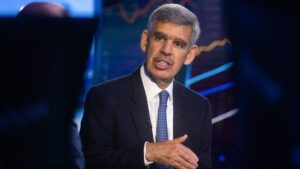Navigating the Uncertain Waters of the U.S. Economy: Insights from Mohamed El-Erian
At Extreme Investor Network, we understand that the economy is influenced by an intricate web of factors, and recent statements from Mohamed El-Erian, Allianz’s Chief Economic Advisor, highlight some critical uncertainties facing the U.S. economy. As markets and consumers navigate the evolving landscape, it’s essential to unpack these insights and consider their implications for investors and economic enthusiasts alike.
The Tariff Tipping Point
Dr. El-Erian recently sounded the alarm about President Donald Trump’s extensive import tariffs, indicating that they pose a significant risk to the U.S. economy, with recession probabilities reaching 50%. He emphasized that these reciprocal tariffs are not just a domestic issue; they threaten to reverberate across the global economy, reshaping growth expectations and inflation rates.
“The U.S. could see growth expand between 1% and 1.5% this year,” El-Erian remarked, a stark contrast to the International Monetary Fund’s earlier projection of 2.7% growth. This dip represents a “significant change” and leads to the notion of "stall speed"—essentially a rate of growth that’s insufficient to support necessary resource reallocations, thus increasing recession risks.
Inflationary Pressures Amid Tariff Turmoil
As the trade stalemate unfolds, El-Erian warns that financial markets may be underestimating the inflationary impact of these tariffs. Initially, the market’s reaction centered on potential growth slowdowns; however, El-Erian notes that we may not yet have seen the full range of consequences, particularly regarding inflation and the central bank’s responses.
In a striking admission, he stated, “If we’re lucky, we’ll see only one rate cut from the Fed this year.” This anticipation diverges sharply from the market’s expectation of four rate cuts, emphasizing how unpredictable the current economic environment remains.
Global Ramifications of U.S. Slowdown
The interconnectedness of modern economies means that a downturn in the U.S. may lead to more profound impacts elsewhere. El-Erian pointed out that if U.S. growth decelerates, other countries, especially those that heavily rely on trade with the U.S., might experience even sharper declines. This perspective is critical for global investors, reminding us that vigilance should extend beyond domestic borders.
Interestingly, the immediate aftermath of the tariff announcements saw European currencies gain significant ground against the dollar, with the euro and British pound reaching their highest levels in six months. However, El-Erian believes that any weakness in the dollar may be temporary, asserting that as the global narrative unfolds, the long-term view might actually lead to a strengthening dollar once the initial market reactions subside.
Short-Term Pain for Long-Term Gain?
Economists remain divided on the long-term consequences of the tariffs. While the prevailing sentiment acknowledges the immediate pain caused by such measures, there’s ongoing debate about whether they might yield beneficial outcomes in the future. El-Erian cautioned, “Can you make a case that this is pain now for gain later? Yes. Can you make it with conviction? No.” This uncertainty may serve as a critical consideration for investors contemplating their next move.
Conclusion
In summary, the insights from Mohamed El-Erian underscore the complexities at play within the U.S. and global economies. At Extreme Investor Network, we encourage our readers to remain informed and adaptable in these uncertain times. As we navigate potential downturns, inflationary pressures, and market volatility, understanding these dynamics can empower individuals to make more informed investment decisions.
For further insights into the ever-evolving economic landscape, stay connected with Extreme Investor Network. We’ll continue to provide you with expert analysis and updates to help you stay ahead in your investment journey.

